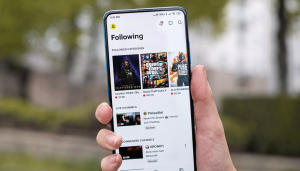How to Give Feedback to Peers and Your Team as a Leader
Effective feedback is a vital tool for any leader or team. It can boost performance, foster growth, and strengthen relationships within a team. However, providing feedback isn’t always straightforward.
How can leaders deliver honest, constructive feedback without causing defensiveness or diminishing morale?
Gary Vaynerchuk, in a recent conversation with Henry Ward on the GaryVee Audio Experience Podcast, shared some valuable insights into this delicate balance. Let’s dive into their conversation to uncover key strategies for delivering feedback effectively.

1. Overcoming the Fear of Candor
One of the most common challenges leaders face is the fear of being candid. Gary Vaynerchuk openly admits that earlier in his career, his love for his employees made him hesitant to deliver tough feedback.
“I used to struggle with delivering bad news because I have a disease called ‘I love my employees,’” Gary shared, highlighting a sentiment many empathetic leaders can relate to.
“Candor was my kryptonite. I’ve gotten way better in the last three years. I talk about kind candor. It’s balancing honesty with empathy, compassion, and context.” – Gary
“The problem I have with the book is it’s a one-size-fits-all. Everything I know about people is to know your audience—how you talk to them matters.” – Henry
2. Introducing Kind Candor
Instead of radical candor, which can sometimes come off as harsh and unempathetic, both Gary and Henry advocate for a more nuanced approach—what Gary calls “kind candor.”
This method emphasizes delivering feedback with empathy and understanding, ensuring that the feedback doesn’t feel like an attack but rather a supportive discussion.
“I call it kind candor at VaynerMedia because I think radical candor feels like, ‘Let me give you the purest form of it,’ which I actually think seeps into people’s real struggle with candor—they don’t deliver it with enough empathy, compassion, sympathy, and context.” – Gary
“Lead with curiosity. If the employee disagrees with your feedback, instead of doubling down, ask them, ‘Why do you think I don’t think you’re doing well?’” – Henry
Henry’s approach opens up a dialogue and shows the employee that you value their perspective. While Gary focuses on empathic undertones to pacify the conversation.

3. Tailoring Feedback to the Individual
A critical point in how to give feedback to peers, both Gary and Henry stressed is the importance of knowing your audience. Different employees will respond differently to feedback based on their personality, experience, and confidence levels.
This means leaders need to be adaptable and sensitive in their feedback approach.
“Radical candor kind of works no matter who you’re talking to… everything I know about people is to know your audience. How you talk to them matters.” – Henry
- Ask First: Before jumping to conclusions or offering solutions, ask the employee how they feel about their performance.
This can reveal alignment or discrepancies in perspectives. As Henry advised:
“If the employee agrees they’re not doing great, that becomes a collaborative discussion of fixing it. If they think they’re crushing it, that’s a different conversation.” – Henry
4. Avoiding Common Pitfalls
Feedback conversations can sometimes go awry, especially if handled insensitively or if the leader comes across as defensive. Here are some pitfalls to avoid:
- Don’t Double Down: If an employee disputes your feedback, resist the urge to insist you’re right.
Henry points out that managers often double down with reasons why the employee isn’t doing well, that it is a losing battle. Instead, ask why the employee might feel differently. - Beware of Bias: Gary and Henry discussed the danger of “idiosyncratic manager bias,” where personal biases or insecurities might color feedback.
Gary highlights the need for self-awareness and objectivity:
“I’ve seen managers give feedback just to keep someone down because they know that person is better than them” – Gary
5. Present Feedback as a Subjective Opinion
Rather than presenting feedback as an absolute fact, framing it as a subjective opinion based on available data can reduce defensiveness and promote open dialogue.
“I train my leaders to say, ‘In my subjective opinion, from my purview and the data I’ve gathered, I believe you’re not crushing it.’ This approach respects the employee’s perspective and invites discussion.” – Gary suggests
- Why It Works: This method recognizes that feedback is based on interpretation and encourages employees to share their viewpoints, making it a two-way conversation.

6. Building a Culture of Feedback
Feedback should not be an occasional, dreaded event but a continuous and natural part of the workplace culture.
Creating an environment where feedback is normalized and valued can significantly enhance its effectiveness.
- Normalize Feedback: Gary emphasized the importance of making feedback a regular part of the work culture. He suggests that feedback is a tool for learning and improvement, rather than just for correction.
- Model Openness: Leaders should be open to receiving feedback themselves. This behavior sets a tone of transparency and encourages employees to be more receptive to feedback.
7. Broader Implications: Feedback in Entrepreneurship and Education
Gary and Henry also touched on how feedback and growth mindset are vital in entrepreneurial environments, contrasting this with traditional education systems that often don’t nurture these qualities.
- Gary shared how his poor academic performance didn’t deter his entrepreneurial success. “I was literally the 11th worst student in my class. But I started a company from scratch, and now we have 2,000 employees,” – he reflected, illustrating how success doesn’t always correlate with conventional metrics.
- “Entrepreneurs in America are celebrated, but they’re also seen as the exception, not the rule. Our education system is designed to produce lawyers, doctors, and accountants—not entrepreneurs,” – Henry pointed out, highlighting a systemic gap in fostering entrepreneurial skills.

In Summary
- Practice Kind Candor: Deliver feedback with empathy, compassion, and context.
- Know Your Audience: Tailor your feedback approach based on individual personalities and needs.
- Lead with Curiosity: Start feedback conversations by asking questions to understand the employee’s perspective.
- Avoid Defensiveness: Don’t double down on your point of view if there’s disagreement. Instead, explore why there’s a difference in perspectives.
- Create a Feedback Culture: Make feedback a regular, open part of your organization’s culture.
Providing effective feedback is an art that requires empathy, patience, and a willingness to understand different perspectives.
As Gary Vaynerchuk and Henry Ward have highlighted, using “kind candor” can transform feedback from a potentially confrontational interaction into a constructive, growth-oriented conversation.
By leading with curiosity, avoiding biases, and presenting feedback as subjective, leaders can foster an environment where employees feel valued, understood, and motivated to improve.
Ultimately, feedback is not just about pointing out what’s wrong—it’s about guiding and supporting your team towards their highest potential.
(Source: GaryVee Audio Experience with Henry Ward, CEO of Carta)




